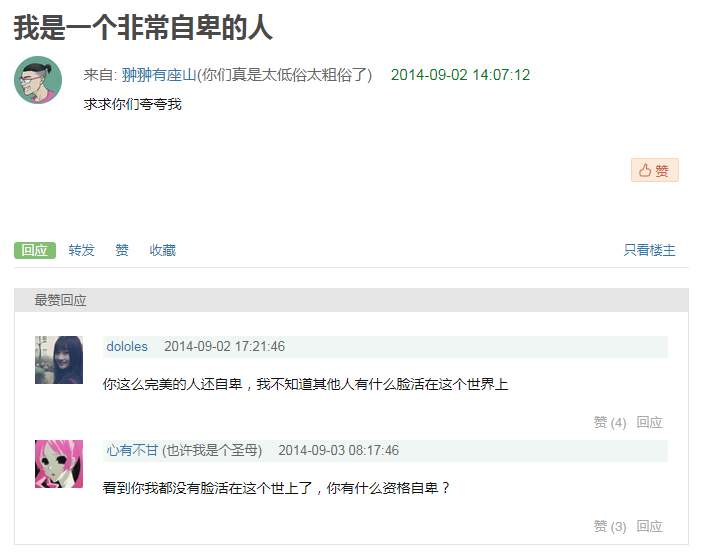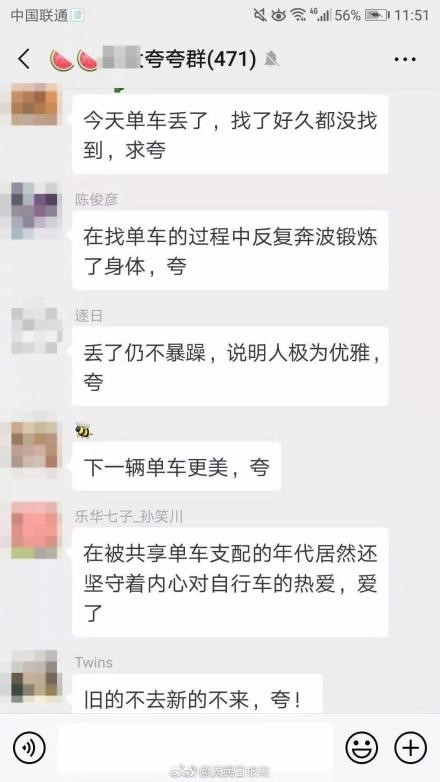
This is People’s Daily Tonight, your news source from China.
____
To praise or to troll? 'Praising groups' become Chinese new social media craze
Chinese Internet users are flocking to chat groups on social media where they can seek consolation by receiving others' compliments.
The concept of a “praising group” can be traced back to 2014 to a topic group in Douban, a Chinese social network service, where people encourage each other when life is not going well.

One of the first posts in the “mutual praise group” in Douban. In response to a post that said, “I’m very self-abased, please praise me,” other people responded, “You are so perfect that makes me feel self-abased” to offer encouragement. (Screenshot from Douban)
With the increasing diversity of the number of social platforms, "praising groups" went viral again this year when university students formed chat groups on social media like Wechat to praise group members with over-the-top compliments. No matter how unfortunate things are that happen, one can always seed solace. Even inappropriate behaviors like being late or absent for class can get exaggerated praise.
In order to seek more custom-made compliments, people are starting to hire “professional praise givers” on e-commerce sites like Taobao. For a wide range of prices, people who buy services will be invited to a WeChat group and be showered with praise from various people.
At the same time, another kind of chat group has appeared. A "trolling group," the complete opposite of the “praising group,” allows members to criticize or even verbally attack a person who asks for criticism.
How should people consider the two Internet sensations and see the social meaning behind it? An online poll gives a surprising answer, finding that although most people prefer “mutual praise groups” to “trolling groups,” around 61 percent of respondents say they will join neither group even if they have a chance.
Psychologically speaking, people support offering praise to others, recognizing its huge positive power. People in need of relief, especially teenagers, can get consolation and find emotional appeals in compliments and encouragement. Praise givers can also improve their own character by recognizing the virtue in others.

Even if some compliments are exaggerated and illogical, people tend not to refuse any cheesy but kind words. They even get amused by the ridiculousness of it.
In contrast, a "trolling group" offers tough medicine and a reality check. To some extent, "trolling" within boundaries offers a reasonable emotional catharsis, bringing people back to reality and inspiring reluctant people to move on.
However, we must keep calm and not stray into the territory of either group, because neither sensory happiness nor stimulating criticism bring much practical meaning to our reality.

In response to a post that said, "I lost my bicycle and can't find it anywhere. I need some praise," others said, "You are getting exercise when you look for your lost bicycle," "You are so gentle to keep grace even after you lost a bicycle," and "You can get a better one now" to encourage the member. (Screenshot via Weibo)
Attaching emotions to the commentary of others shows a lack of self-regulation. When one consciously needs to be praised or criticized, the motive may not only be to obtain an emotional boost. The motive is more likely a lack of self-regulation and a weak sense of self. If one alleviates the pain of doing wrong things by seeking praise, one can never learn the proper lesson and improve oneself. If one can only go forward by facing harsh words, one will gradually lose the motivation to grow up.
Compared to praising or trolling, what people need is a balanced and healthier social environment and a more mature mental state so that they will not be easily pushed around by flattery compliments or harsh criticism.
____
And that’s People’s Daily Tonight, thanks for joining us.
(Produced by Chi Jingyi; text by Bao Han from People’s Daily app)


